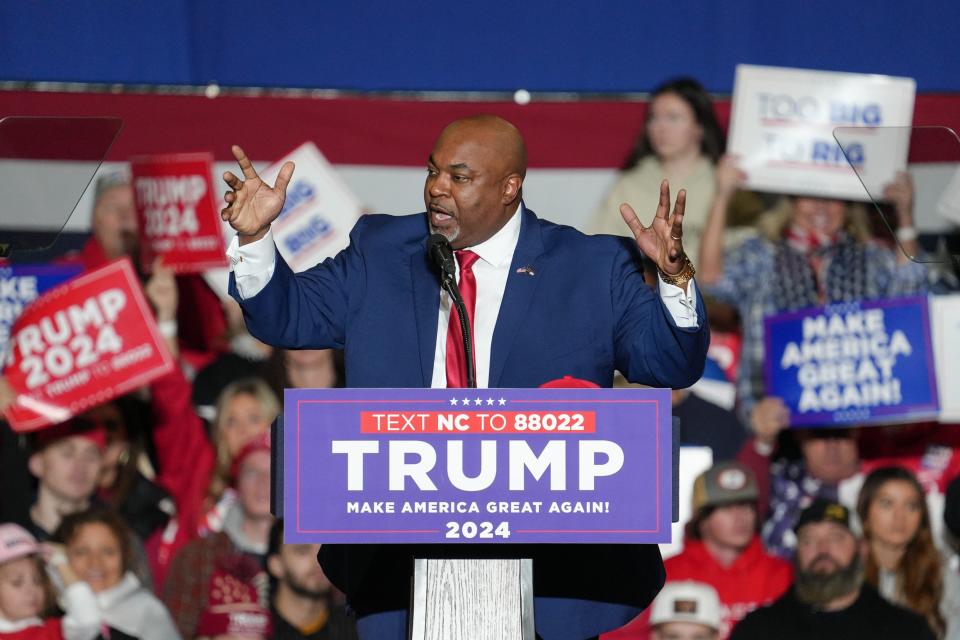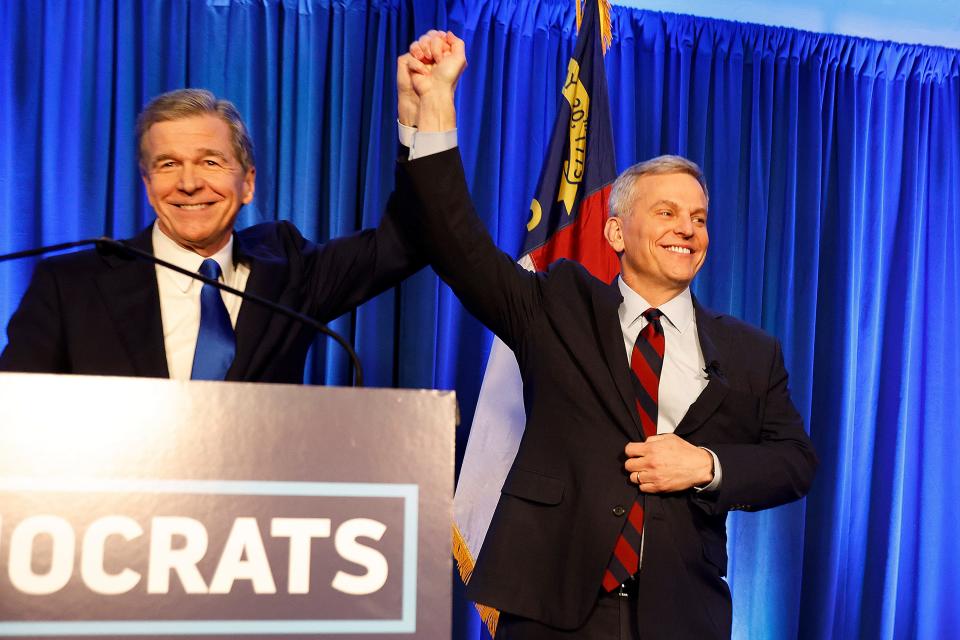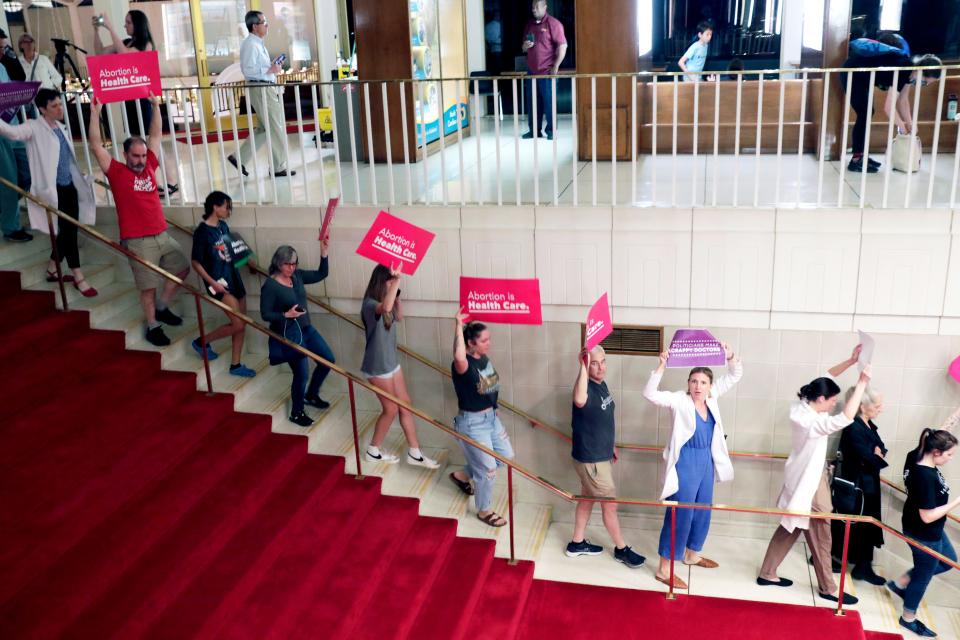'Anti-Trump' Republicans in North Carolina feel alienated by Mark Robinson
RALEIGH, N.C. – Ex-Republican Phebe Roberson, 75, said she “can’t stand” former President Donald Trump and voted against him in North Carolina’s GOP primary earlier this month.
She also cast a ballot against Lt. Gov. Mark Robinson, the incendiary Republican gubernatorial candidate who received Trump’s endorsement ahead of the primary.
“I feel like the far right has just stolen my Republican party, and I can’t identify with it anymore,” said Roberson, now an independent and resident of the state capital for about 40 years.
Robinson has ignited intense backlash for his history of comments ranging from support of antisemitic conspiracy theories to lambasting school shooting victims.
Robinson previously made remarks calling calling homosexuality and transgenderism “filth" and claiming that “so many freedoms were lost” during the Civil Rights Movement.
North Carolina stands to play a pivotal role in 2024 and potentially decide the presidency for either party. Trump carried the state in the last two presidential elections by slim margins. And voters and political analysts USA TODAY spoke with said Robinson's inflammatory persona could stand to isolate even more voters, like Roberson, from voting red.
Southern Democrat vs. MAGA Republican: Why NC governor race is a defining contest for 2024
North Carolinians sour on Robinson's rhetoric
Justin Bradford, 47, of Pinehurst, North Carolina, said he used to be a straight-ticket voter for the GOP.
A self-described “unaffiliated, fiscally conservative moderate” who prefers limited government, Bradford became more of a “mixed voter” around the time of former President George Bush’s second campaign. He said he switched his party registration to unaffiliated and voted for former President Barack Obama in 2012.
Still, he said the Republican party “hadn't really turned the corner yet.”
“I really feel like 2016 was the year that the mask came off,” Bradford said.

Bradford, like Roberson, voted in the state primary for former South Carolina Gov. Nikki Haley, who has since suspended her campaign. He said he sees only an escalation of violence since Trump took office and politicians like Robinson rose to prominence.
“That corner was turned, and it's like a Pandora's box now.”
To many, Robinson’s remarks and demeanor are reminiscent of the former president, according to research by Progress NC Action, a liberal-leaning advocacy organization working with other progressive coalitions in the state.
"Spoiled, angry, know it all CHILDREN are trying to tell law abiding ADULTS that we must give up our Constitutional RIGHT to own certain weapons," Robinson wrote in a 2018 Facebook post about student survivors of the Marjory Stoneman Douglas High School shooting in Parkland, Florida that year.
"For voters who are anti-Trump, they listen to the things that Robinson says, and the connection was immediate to them. They're like, ‘Oh, this is another Trump,’” said Pia Nargundkar, messaging director for the research and communications group.
Robinson first gained attention with his fervent defense of gun rights at a Greensboro City Council meeting in 2018. He was elected North Carolina’s first Black lieutenant governor in 2020.
Mike Lonergan, communications director for Robinson's gubernatorial campaign, said the lieutenant governor and his comments are being taken out of context.
"There is no low to which the Democrats will not stoop to smear Mark Robinson," Lonergan said in a statement to USA TODAY.
But Bradford said Robinson is stoking hate in a state grappling with its Confederate history and pockets of deep-seated bigotry.
“When you have these ideologues like Mark Robinson, like Trump, and they're saying, ‘We're going to go down to the Capitol and fight like hell,’ or you're calling people ‘filth,’” Bradford said, “some people are going to get the idea that you can now commit an act against another person, and it's sanctioned by this leader, so to speak.”

'Road to the presidency': Why eyes are on North Carolina
Robinson easily secured his spot on November’s ballot, defeating two challengers in the Republican primary, including runner-up and state Treasurer Dale Folwell by more than 40 points.
In the general election, Robinson faces Stein, North Carolina's attorney general, who likewise sailed to victory in the Democratic primary.
Their race is expected to be one of the country’s most competitive gubernatorial races this year.
The stakes are also high at the top of the ballot in North Carolina.
Democrats have eyed the Tar Heel State since Obama won there in 2008 and shifting demographics hinted at the possibility of a tide turning blue.
Trump-Biden battleground: Can Democrats flip North Carolina in 2024? What Super Tuesday showed us
But minus Obama's one exception, Republican presidential candidates have kept a firm hold on North Carolina for almost 50 years.
Still, Democratic Gov. Roy Cooper told USA TODAY that he believes the “road to the presidency” goes through his state.
“And I believe that we can win this state for (President) Joe Biden when you look at the momentum that’s occurring right now, and you look at how outrageous Donald Trump has become, even more so since his presidency,” Cooper said.

Trump won North Carolina in both 2016 and 2020, though his margin of victory was much narrower, just over one percentage point, in the latter. This has some on the left suggesting his popularity may be slipping with the Tar Heel constituency.
"He's narcissistic, bombastic,” Roberson, the Raleigh moderate, said of the former president. “I voted for him the first time, but he proved his way along between 2016 and 2020. Nope, I changed my party affiliation.”
While her feelings about the lieutenant governor are less intense, she said she also cannot agree with Robinson’s positions, particularly about the LGBTQ community.
“I consider myself to be conservative and a Christian,” Roberson said. “Jesus said show love and when you make remarks like he has about fellow Americans, I don’t agree with it.”

Abortion concerns cross demographics
One issue pulling voters, including more moderate conservatives, out of Robinson and Trump’s corner is abortion, Nargundkar said.
“This is an issue that is concerning to independent voters, it's concerning to Republican women, it's concerning to Black voters,” she said.
National bellwether: Abortion access in North Carolina may hinge on tight governor's race
North Carolina lawmakers passed a new 12-week abortion limit, with some exceptions, last summer. A Meredith College poll in September found North Carolinians nearly split on the change, with 47% approving the law and 45% disapproving.
A January survey by Public Policy Polling, affiliated with the Democratic party, found a greater share of North Carolinians, 52%, would prefer a governor that protects abortion rights, versus 35% who prefer their governor restrict access to the procedure.
Robinson has in the past signaled that he would support a total ban on abortion.
“For me, there is no compromise on abortion,” he told a Baptist church congregation during his 2020 lieutenant governor campaign. “It makes no difference to me why or how that child ended up in that womb.”
As a gubernatorial candidate, Robinson has attempted to soften language around his stance.
His campaign said that as governor Robinson would support legislation limiting abortion after a heartbeat is detected, often six weeks, with some exceptions for rape, incest or life of the mother.
Bradford said he’s thinking about his 18-year-old daughter in both the gubernatorial and presidential election.
“I have some genuine concerns for my daughter for the kind of world, you know, she's going to operate in now as an adult,” Bradford said.
“I don't want to be super dire about things. But I'm a little bit freaked out right now.”
USA TODAY Chief Political Correspondent Phillip M. Bailey contributed reporting.
This article originally appeared on USA TODAY: North Carolina governor candidate Mark Robinson pushes away GOP voters
